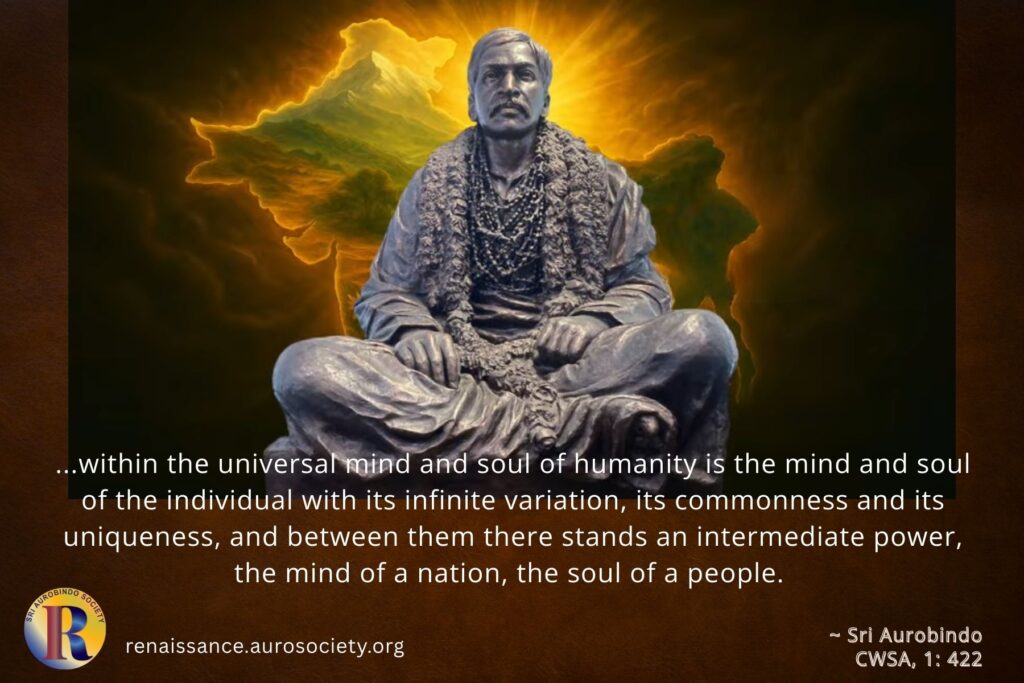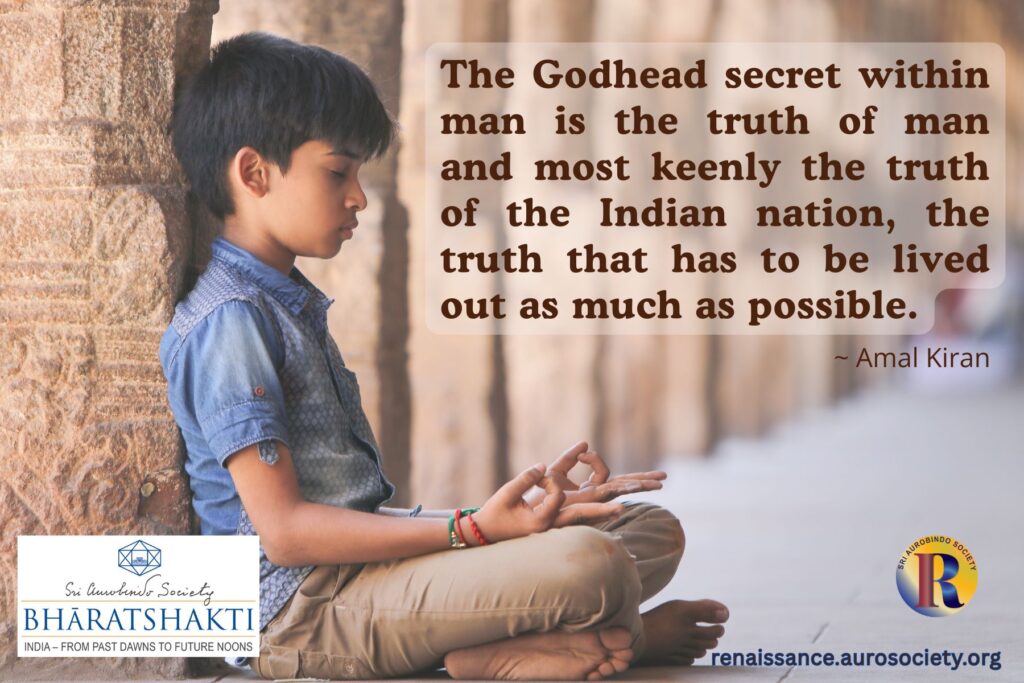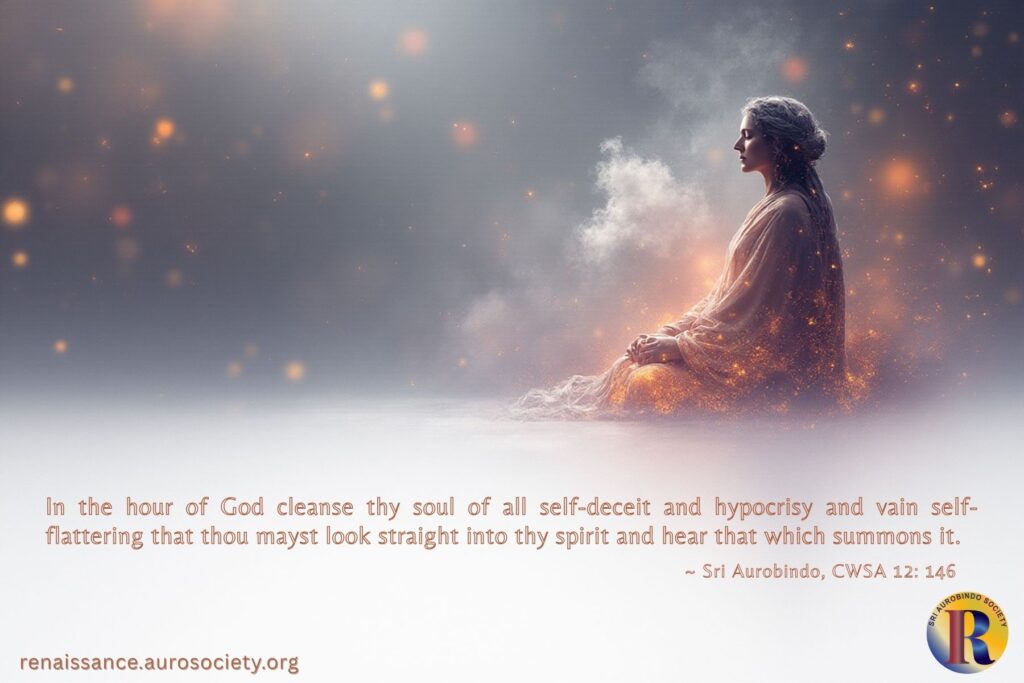Editor’s note: C.R. Das, Sri Aurobindo’s defense counsel in the Alipore Bomb case spoke of Sri Aurobindo “a prophet of nationalism, a poet of patriotism and a lover of humanity.” Dr. Charan Singh Kedarkhandi elucidates beautifully how Sri Aurobindo’s birth is an Eternal Birth, and how these three magical epithets fit his personality. A number of appropriate references in Sri Aurobindo’s own words make this a delightful reading.

Let me start by quoting Dr. Nirodbaran, one of the closest cohorts of Sri Aurobindo’s ephemeral lila:
Never has there been recorded in earth history a phenomenon where a person of Sri Aurobindo’s supreme eminence has lived secluded from the world-gaze and quietly and unobtrusively passed away. Such a complete self-effacement can be thought of only of one who is a god or has become a god. It is certain that one day the world will wake up to realize who he was and what it owes to him as it becomes more and more enlightened in its consciousness.
~ Twelve Years with Sri Aurobindo, p. 273
This realization of Sri Aurobindo could have come only through Nirodbaran. He was one of the fortunate few who lived twelve years in close proximity to the Mahayogi and observe his life very closely and minutely, somewhat “beyond the surface”.
Only those who have been active participants of the Divine Drama have the power and grace to unfold the mystery behind the show. For an outsider like this author, any peep, however conscious, into Sri Aurobindo’s life and lila would be a child’s babbling. Although ‘babbling’ too has its need and meed!
For the world, the unique and ubiquitous life of Sri Aurobindo is remembered as a Mahayogi, philosopher, seer-poet, revolutionary leader, scholar and literary critic and a champion of Indian nationalism. But all these adjectives and identities are our human understanding of Sri Aurobindo.
Expecting divine forgiveness from Gurudev, I wish to tweak three lines of his Savitri in order to make it clear that how, despite our efforts and aesthetics of ideas, Sri Aurobindo’s real personality, his rupa and swarupa, remains elusive and ineffable:
A thousand icons they have made of his
– Sri Aurobindo (CWSA, Vol. 33, p. 276)
And find him in the idols they adore;
But he remains himself and infinite.
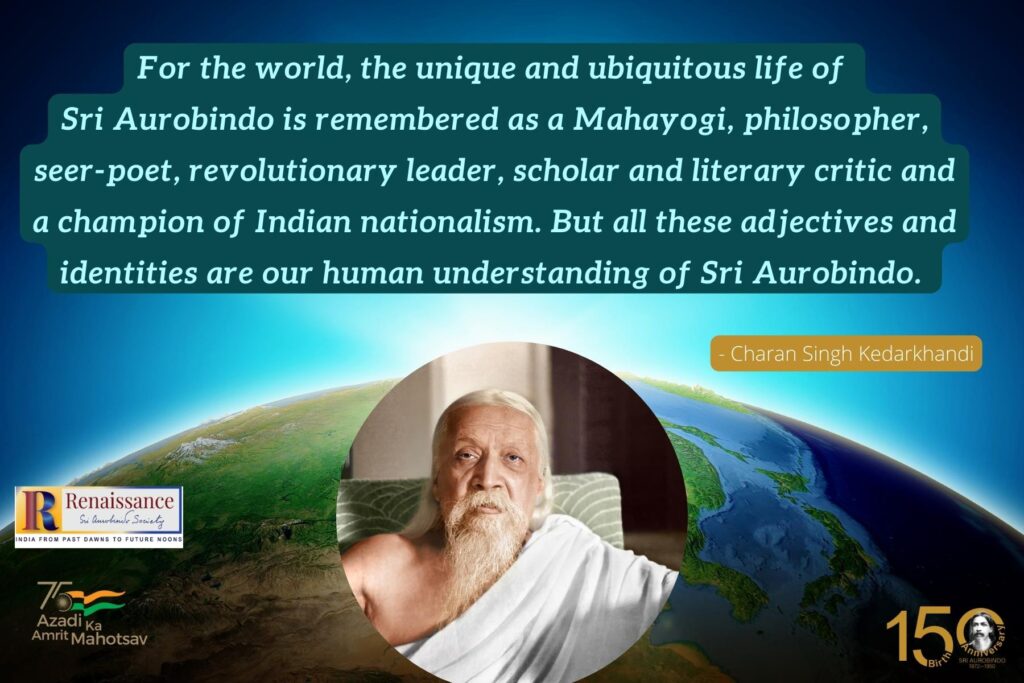
An Eternal Birth or a “Birth Sublime”
Sri Aurobindo’s is an Eternal Birth or a “Birth Sublime”, a puissant and permanent phenomenon upon earth, touching and transforming humans and earth’s possibilities. He is the leader, the destiny builder, the modern Prometheus (forerunner) of man’s spiritual efflorescence. Sri Aurobindo has been one of the most powerful forces in shaping of human destiny.
In one of her messages, the Mother says that Sri Aurobindo has “presided over the great earthly transformations” (CWM, Vol. 13, p. 10) under different names, forms and identities.
This clearly indicates that Sri Aurobindo’s life is not a subject matter of dates, years and eras, not even of births and deaths. And his spiritual message and transformatory force are also equally timeless. Without the moroseness of denouement, his wonderful story, rishi-dṛṣṭi and overt spiritual force are shaping the world and silently preparing the ground for earth’s ultimate possibilities.
When asked by some disciple why the Mother called Sri Aurobindo’s birth “Eternal,” the buoyant Bhagvati replied:
The sentence can be understood in four different ways on four ascending planes of consciousness:
~ CWM, Vol. 13, p. 10
1. Physically, the consequence of the birth will be of eternal importance to the world.
2. Mentally, it is a birth that will be eternally remembered in the universal history.
3. Psychically, a birth that recurs for ever from age to age upon earth.
4. Spiritually, the birth of the Eternal upon earth.
After understanding and assimilating this message in letter and spirit, the world — Sri Aurobindo’s followers, seekers and scholars included — will surely understand and appreciate him better and in a more perfect way.
During his 78 years on this earth, Sri Aurobindo enriched our understanding of life, yoga, spirituality and humanity. He offered before us a sublime world of superhumanity, based on the transformation of human consciousness.
His ideas about India (whom he gave two beautiful and meaningful names viz. Bhavani Bharati and Bharata Shakti), the best line for her development and her true role in the world are radically different from his predecessors. He presented and prepared a road map for New India, New Humanity and New Spirituality. Can we collaborate?
The whole of Sri Aurobindo’s personality fits within the three magical epithets given to him by C.R. Das, his counsel in the Alipore Bomb case. Uttered in perhaps the most humanly calamitous and divinely decisive time of the Mahayogi’s life, Das strongly defended Sri Aurobindo by calling him “a prophet of nationalism, a poet of patriotism and a lover of humanity.”
Read:
The Series of Avatars and Avatar of the Future
We can comfortably divide Sri Aurobindo’s life within these three aspects of his personality. On all these three counts, he significantly contributed and inspired humanity across the world. His love and sacrifices and his unmatched intellectual acumen inspired revolutionaries like Subhash Chandra Bose and many others.
He entered into India’s political canvas when there was all round lethargy and apathy among Indian masses and complacency among “leaders of the Indian people.”
His concern for his motherland and her people and future is reflected in that sublime series of nine articles which he penned for Indu Prakash. The very title of this series of articles ‘New Lamps for the Old’ is highly symbolic. Let the old and incapacitated people and system of complacency and mendicancy go and vacate place for the New light. That the old system and its champions are defunct and need physical, spiritual and material powers and ways of action.
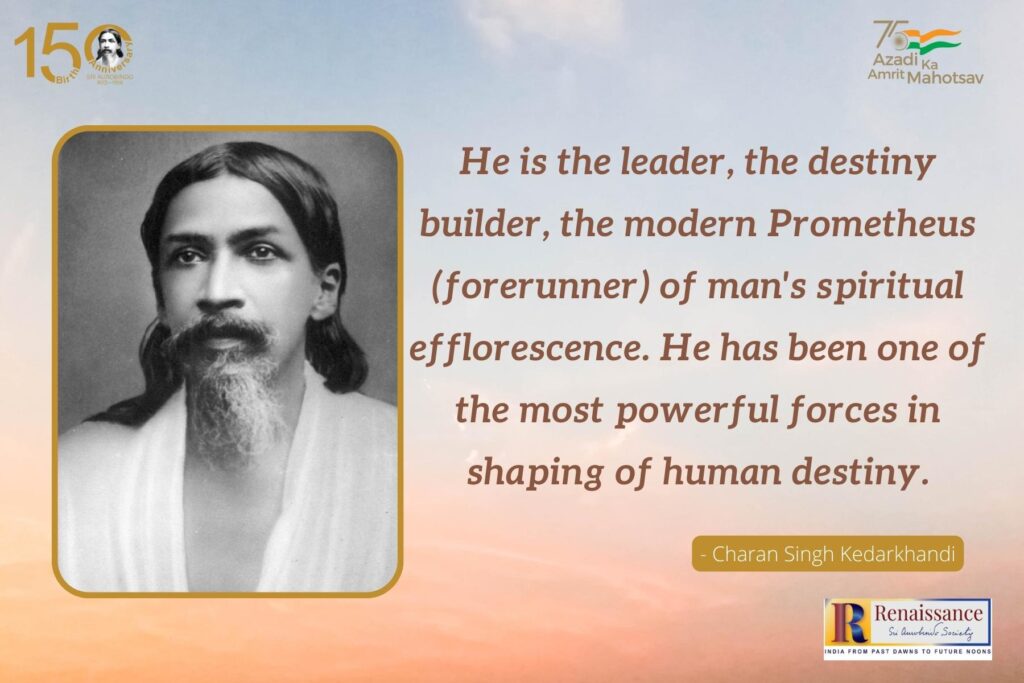
Thirteen years later when Sri Aurobindo took the halter of powerful intellectual communicators like Bande Mataram, Dharma and Karmayogin, he systematized his views and political strategies about India, her fate and future and mulled over the most effective ways of her liberation from Asura.
Moreover, as a political leader, he expressed and interpreted the very spirit of Bharat and called upon the youth of the country to muster courage and join the bandwagon of transformation by imbibing the Indian Spirit within themselves. He categorically stated:
If India is to survive, she must be made young again.
~ CWSA, Vol. 6, p. 83
What is a young nation like? Much of his reflections on the pages of Bande Mataram, Karmayogin and his marvellous book Essays Divine and Human and his insightful letters to brother and disciples are answers to this question.
Sri Aurobindo as ‘Prophet of Nationalism’
As the Prophet of Nationalism, the first work that Sri Aurobindo did was to reveal the actual swarupa and swabhava, form and character of India before Indians! It was he who roared:
. . . what is a nation? What is our mother country? It is not a piece of earth, not a figure of speech, nor a fiction of the mind. It is a mighty Shakti, composed of the Shaktis of all the millions of units that make up the nation. . .”
~ CWSA, Vol. 6, p. 83
Sri Aurobindo didn’t stop there. He seriously contemplated on the existence of India, on the true nature and work before Indians and Sanatana Dharma and the specific purpose and spiritual mission of Indian culture and literature.
The worst thing that could happen with a nation is: complete loss of self-respect and inferiority complex for motherland and her heritage. Sri Aurobindo read this malaise deeply. And with a renewed vigour and valour, he infused the sense of Indianness among Indians and aroused in them the slumbering nationalist.
His speech at Jhalakati in Eastern Bengal on June 19, 1909 has a profound resonance of proud Indian nationalism:
We are no ordinary race. We are a people ancient as our hills and rivers and we have behind us a history of manifold greatness, not surpassed by any other race. We are the descendants of those who performed tapasya and underwent unheard of austerities for the sake of spiritual gain and of their own will submitted to all the sufferings of which humanity is capable. . .
~ CWSA, Vol. 8, p. 38
Thus with an avataric compassion and passion of a prophet, slowly and steadily Sri Aurobindo aroused the nationalistic spirit among the masses and particularly the youth.
He also revealed that political freedom is bound to come as India is the land patronized and preserved by God Himself for the fulfillment of His cosmic lila. But she will not liberate as other nations do. India will be free and mighty, rich and resurgent not just for herself but for the world, for the sake of humanity. She has a god ordained mission, a very proud mission. Mother India has a sacred charge that can be fulfilled only by her.
In Bhawani Mandir, the revolutionary pamphlet whose even casual reading still gives me goosebumps, Sri Aurobindo revealed the mission of India:
India cannot perish, our race cannot become extinct, because among all the divisions of mankind it is to India that is reserved the highest and the most splendid destiny, the most essential to the future of human race.
It is she who must send forth from herself the future religion of the entire world, the Eternal religion which is to harmonise all religion, science and philosophies and make mankind one soul. . . her mission is to purge barbarism (mlecchahood) out of humanity and to aryanise the world. In order to do this, she must first, re-aryanise herself.
~ CWSA, Vol. 6, p. 84
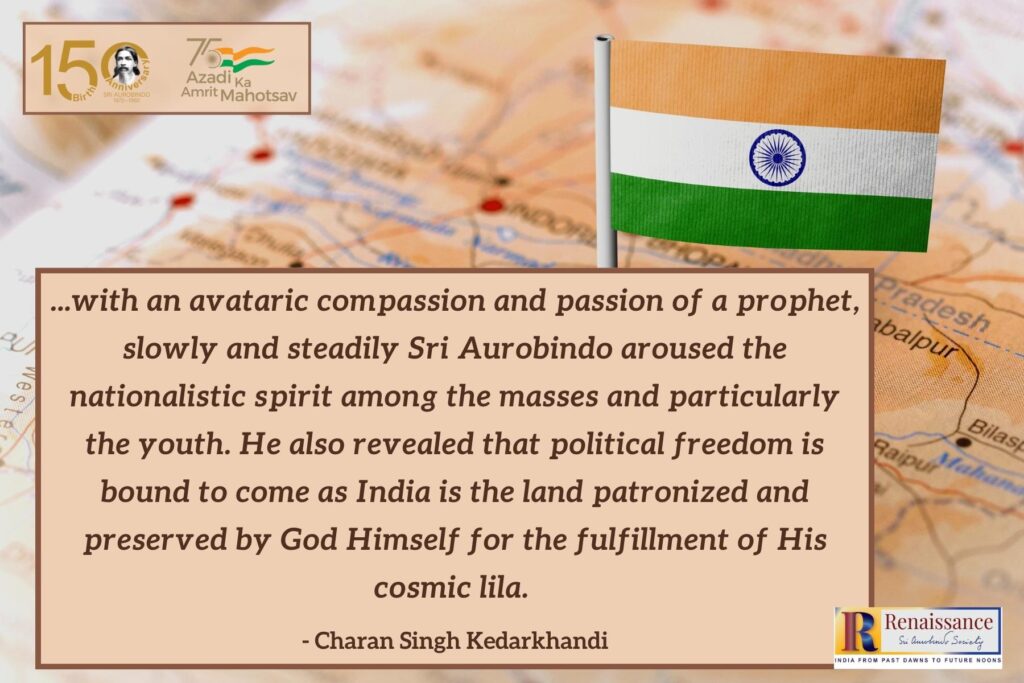
Sri Aurobindo laid down a detailed roadmap for this re-aryanisation of Bharat and the world. He categorically said that in order to fulfill this ‘appointed task’, the youth of India should learn to think. (CWSA, Vol. 12, p. 40).
Voltaire, the glory of the French firmament, used to say that it is impossible to stop a nation once she has learnt to think. In today’s India too, more than religious preachers and pracharaks, we need thought leaders, intellectual stalwarts, giant policy buffs and technocrats who can create and contribute, to borrow a phrase from Dr. Beloo Mehra’s recent book, toward the “creative Renaissance” for New India.
Right from the beginning Sri Aurobindo knew the swabhava, the innate nature of Indian people. And he preached and prepared his political philosophy accordingly. When he gave them lessons of nationalism, he taught nationalism “as a religion. . . a new religion.”
Talking about the neo-nationalistic tide of Bengal and discussing political temperature of the nation as a whole, Sri Aurobindo enthralled a huge crown in Mahajan Wari, then Bombay on January 19, 1908 through these magical mantras:
. . .in Bengal, Nationalism has come to the people as a religion, and it has been accepted as a religion. But certain forces which are against that religion are trying to crush its rising strength. It always happens when a new religion is preached, when God is going to be born in the people, that such forces rise with all their weapons in their hands to crush this religion. . .
Nationalism is not going to be crushed. Nationalism survives in the strength of God and it is not possible to crush it, whatever weapons are brought against it. Nationalism is immortal; Nationalism cannot die, because it is no human thing.
~ CWSA, Vol. 7, p. 819
Sri Aurobindo’s remarkable essay, The Ideal of Karmayogin, should have been an essential part of Indian education system. In it, he appeals to the youth of India to become Indian first by recovering “the Aryan thought, the Aryan discipline, the Aryan character, the Aryan life” and the lost inner swaraj.
He knew that by treasuring physical, moral, mental and spiritual powers and by becoming young and Indian in spirit (not just in birth) and by imbibing the actual spirit of Sanatana Dharma and Indian spirituality, India can easily regain the lost glory of effulgent yesterdays.
Also read:
The Greatness of the Great: A Sesquicentennial Salutation to Sri Aurobindo
Sri Aurobindo as ‘Poet of Patriotism’
The second powerful epithet C.R. Das used for Sri Aurobindo is ‘the poet of patriotism’. There is least doubt that Sri Aurobindo, through his puissant pen and his remarkable speeches, aroused strong patriotic feelings among Indians and prepared them as a nation to sacrifice everything for the motherland. His prose is poetic, his poetry is mantric and his mantras are God in action upon earth.
When most of us were labelled as feeble and effete, Sri Aurobindo roared:
It is ONLY the Indian who can believe everything, dare everything, sacrifice everything.
~ CWSA, Vol. 13, p. 7
The implicit meaning is: my beloved countrymen, believe me that this powerful world conquering British Empire too can be defeated and devastated. Freedom should be commanded and not demanded. Believe that you can be free and strong, invincible and inviolable! Yes, the Mother mighty needs sacrifices, surrenders, heartfelt immolation of her dear sons and daughters. Freedom will not come on a platter, without sacrificing sweat and blood.
During the partition of Bengal Sri Aurobindo penned a powerful and mantric poem in Sanskrit, again arousing and challenging the sleeping lions among Indians, requesting them for supreme sacrifices and majestic battles:
येषां सदैवात्मबलिप्रवृत्ताः शूरा महान्तः प्रमुखाः कुलार्थे।
सौम्या कराली भवति प्रजानां रक्तेन पुष्टा विनिहन्ति शत्रून् ॥२८॥Wherever are great heroes and leaders engaged in continual self-sacrifice for the good of their race, towards those nations does Kali grow gracious, nourished with blood , and thus she crushes their enemies.
~ Sri Aurobindo, Bhavani Bharati, verse 28
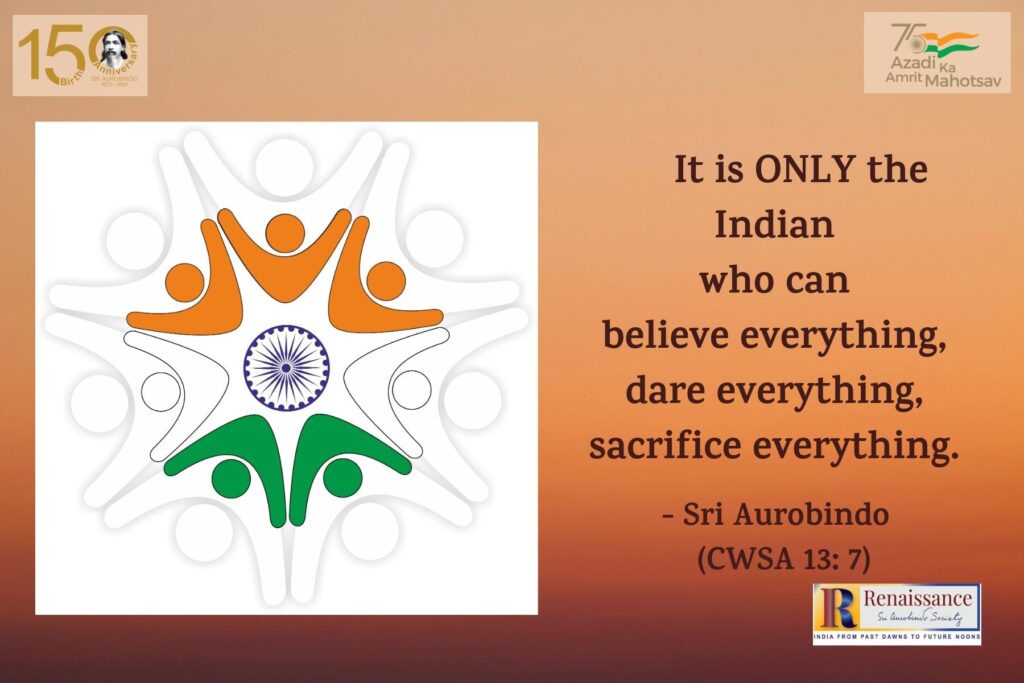
Love and loyalty toward the mother and motherland are not easy. They demand sacrifice unheard of and austerities unmatched. They demand hero warriors and samurai, heroes with spirit of steel, intentions of iron and fragrance of character.
In his poem Invitation too, Sri Aurobindo is inviting heroes for the adventure where “misadventure is a friend”! Forewarning that the call and conviction must be genuine and strong, he invites youth to summit the peaks of paramount glory and freedom and “live largely and freely.”
Sri Aurobindo as ‘Lover of Humanity’
In Savitri, Sri Aurobindo calls this earth “this little whirling globe”! A small place of humans and other species.
One of the striking features of Sri Aurobindo’s Himalayan personality was his catholicity and magnanimity about life and the vastness of his world vision. After touching the shores of Pondicherry in April 1910, whatever Sri Aurobindo wrote and opined has a universal appeal and concern.
All publications brought out through Arya, a monthly review of culture, has the universe in the vision. Nothing has been exclusively written about Indians and for India alone. The Life Divine, Isha Upanishad, The Synthesis of Yoga, The Human Cycle and other valuable volumes first serialized through Arya are a direct address to humanity.
So is Savitri, the cosmic epic addressing the most fundamental of human problems and challenges like the question of ego and ignorance, pain and privation, death and disaster. Even the Letters on Yoga have this quality. Whether an Indian reads them or an American goes through the soothing letters, they feel equally elevated and comforted. The Mahayogi was shaped by western logic and eastern meditation and he reciprocated accordingly.
His love is for all those who love him and are receptive enough to feel the Grace.
Orient and Occidental, African and American, First World and Third World – all these classifications are pigmy and puerile. Sri Aurobindo’s world view is vast and universal and he enfolds the whole universe in his spiritual aura.
Rejecting the popular current of support and sympathy for Hitler during WW2 in almost whole of India, not the least in his own Ashram, Sri Aurobindo quickly recognized the Devil taking possession and working through Hitler. Without wasting any time he put all his spiritual powers to foil and fail the Asura in Hitler and his cohorts. Almost every day Sri Aurobindo expressed worries for the future of the world. And as a gesture of his support to the Britishers/Allies, he took two steps forward and financially contributed to the War Fund.
Sri Aurobindo’s suggestion for accepting Cripps Mission’s proposal for Dominion Status, if accepted, would have averted not only the painful partition of India but also prevented the gory and horrid legacy of bloodshed during the partition. Life would be more beautiful, amicable and buoyant in the subcontinent had we listened to Sri Aurobindo.
Again in 1950, he warned Indian leaders against Mao’s aggression and malevolent expansionist intentions. But alas, India continued to enjoy the dulcet slumber of Hindi-Cheeni bhai bhai, till 1962. How incurable is human hubris, his smug stupidity, his suicidal ignorance. Prophetic are these words from Savitri:
He walks by his own choice into Hell’s trap ;
~ CWSA, Vol. 34, p. 440
This mortal creature is his own worst foe. . .
[ . . . ]
An idiot hour destroys what centuries made. . .
The world-lover in Sri Aurobindo knew that only and only through the development of a brotherhood of soul can this world be saved and heaven made possible here. Yoga and Spirituality are the roads to make this bonhomie happen, to realize and materialize this brotherhood on earth.
His spirit of internationalism and his immense faith in the innate and essential goodness of man are the bedrock on which he established his spirituality and ideals like world unity. His Grace and compassion are universal and potent, easy and accessible.
Sri Aurobindo is himself The Cosmic Man (vishwa purusha) about whom he speaks in his poem of the same title which is reminiscent of Virat Swarup of the Vibhuti Yoga of Bhagavad Gita:
I look across the world and no horizon walls my gaze;
~ CWSA, Vol. 2, p. 637
I see Tokyo and Paris and New York,
I see the bombs bursting on Barcelona and on Canton streets. . .
Sri Aurobindo’s cosmic empathy and universal vision of oneness are not limited to only the human world. Every creature moving under the blue sky is within his gaze of Grace. In the same poem, he further adds,
I am the beast he slays, the bird he feeds and saves;
~ CWSA, Vol. 2, p. 637
The thoughts of the unknown minds exalt me with their thrill;
I carry the sorrow of millions in my lonely breast.
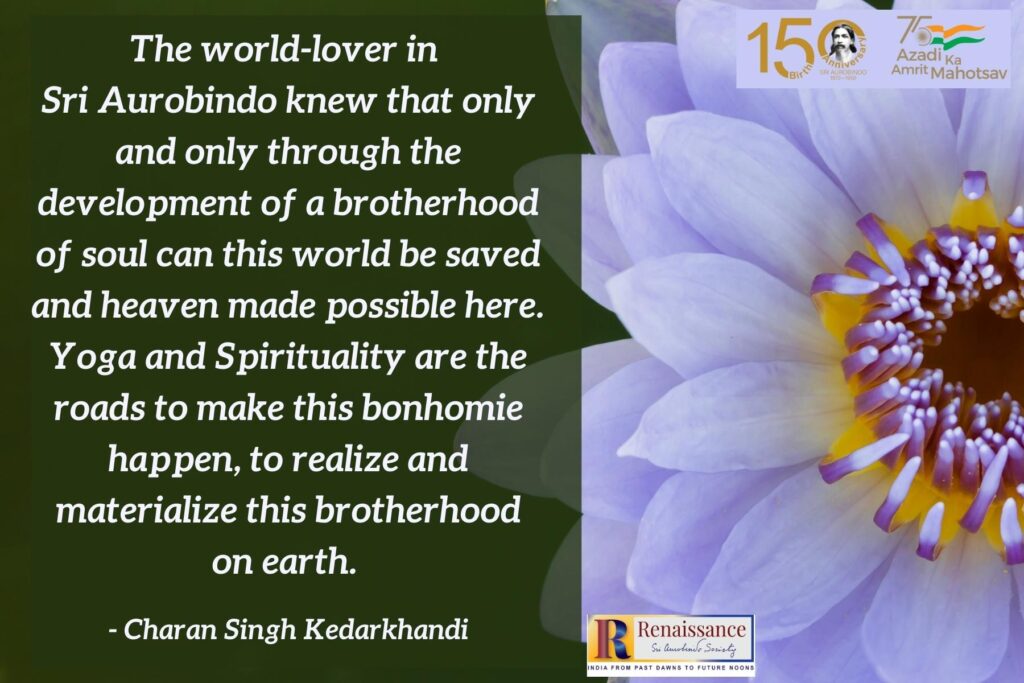
This year marks the 150th anniversary of the ‘Birth Sublime’ that Sri Aurobindo is. There can’t be a better “Hour of God” to listen to and assimilate the message of Sri Aurobindo.
Let us imbibe the spirit of India as Sri Aurobindo did and suggested others to do in his times and not follow the “tempting directions” (CWSA, Vol. 36, p. 503) and misleading voices around us. India can surely become a leading light, a powerhouse of inspiration for the world, a cosmic healer and world-teacher and best serve herself and humanity “by being herself and following the law of her own nature”(CWSA, Vol. 20, p. 38).
Are we ready even after 150 years?
Also see:
The Timeless Relevance of Sri Aurobindo

~ Design: Raamkumar

